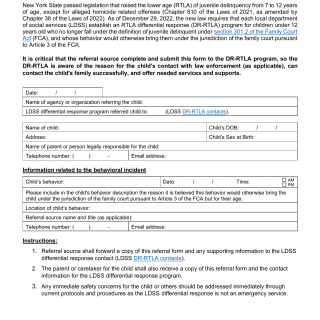OCFS-2210. Raising the Lower age of Juvenile Delinquency Differential Response Referral Form
Form OCFS-2210 is a Differential Response Referral Form used to raise the lower age of Juvenile Delinquency. This form is used by New York State's Office of Children and Family Services (OCFS) to refer youth aged 16-18 to juvenile justice services.
This form is used by OCFS to refer youth who have been referred to the juvenile justice system and are in need of services. It is filled out by an OCFS representative and requires information about the youth, such as age, gender, race/ethnicity, and contact information. The form also includes a section for the youth's parent or guardian to provide contact information and sign off on the referral.
Important fields in this form include the youth's age, gender, race/ethnicity, contact information, and any prior history of juvenile delinquency. It is important that all the information on the form is accurate and complete, as it is used to determine which services the youth may be eligible for. It is also important that the parent or guardian of the youth signs off on the referral.
An example scenario where this form would be used is if a youth aged 16-18 has been referred to the juvenile justice system and is in need of services. The OCFS representative would fill out the form and provide contact information for the parent or guardian of the youth, and the parent or guardian would sign off on the referral. The form would then be used to determine which services the youth may be eligible for.
The benefits of using this form are that it helps to ensure that the youth is referred to the appropriate services that the youth needs. It also helps to ensure the accuracy of the referral process and that the youth is receiving the best possible services.
Documents that may need to be submitted along with this form include medical records, school records, legal documents, and any other documents that may be relevant to the youth's referral. Related forms and alternatives that may exist for similar transactions or purposes include forms for the referral of youth to other services such as mental health services and substance abuse services.

